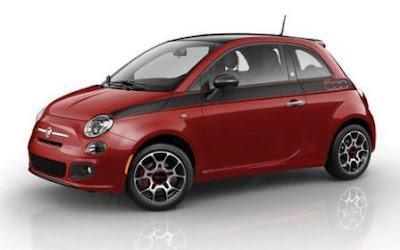
Fiat 500,The little car picks up where the MINI (its most direct competitor) left off 8 years ago. The 500’s cabin slaps you in the face with a reminder that cheap cars don’t have to have cheap looking interiors. At just 140 inches long, the Fiat is 6 inches shorter than the MINI and more than a foot and half shorter than the Ford Fiesta; this car is seriously tiny. The $17,500 model I drove (Sport) throws in larger and better looking wheels, keyless entry, steering wheel controls, and fog lamps. The competition for the Fiat 500 is evenly split between new sub 20K cars (Honda Fit, MINI Cooper, Ford Fiesta, Kia Forte) and quality used cars. It will be interesting to see if Fiat/Chrysler can match MINI USA’s marketing gusto. Unless “standard car ad” is a personality. Only time will tell, but there’s no reason that Fiat shouldn’t able to step up and start eating other advertisers’ lunch with this car.
Remember Fiat? Remember the joke about Fiat meaning “Fix It Again, Tony”? That was the American rap on these cars: Mechanical maladies, early rust, poor resale value, and mediocre service from a rag-tag dealer body. This dramatic comeback is widely credited to Sergio Marchionne, the Italian-Canadian turnaround specialist who took over in 2004 as CEO of Fiat Auto Group, the vehicle division of the Fiat SpA combine. More recently, Fiat formed a global strategic alliance with Chrysler. Future product plans have yet to be finalized, but early reports say Fiat products and platforms will play a significant part in future Chrysler offerings.
There are some interesting parallels between the British-sourced Mini and the U.S.-market Fiat 500. First, both were designed by Frank Stephenson, who joined Fiat after creating the 2002 Mini. (He subsequently moved to head of styling for the Alfa Romeo division, but has since left Fiat’s employ.) The wagon may be a reprisal of the classic Fiat 500 Giardinetta; think Mini Cooper Clubman with an Italian accent. As a 2-door hatchback, which will surely be the mainstay seller, the Fiat 500 is about 5 inches shorter, over an inch slimmer, and 3.2 inches taller than the equivalent Mini Cooper. Both cars have front-wheel drive, pert retro styling, and seating for four. But where the Mini is built on a purpose-designed platform, the Fiat 500 shares underpinnings with Fiat’s entry-level Panda. The interesting new TwinAir 2-cylinder engine is also available in some markets. In the States, the 1.4-liter engine is rated at 101 horsepower.
Like the current Mini, the Fiat 500 is a nostalgia piece, an updated version of a charismatic original. The question is, will American's embrace this Italian import like they have the Mini?
suspect that the enthusiasm flows from confidence about the 500's distinctive personality, which—like BMW's reincarnated Mini Cooper—draws heavily on the car's cultural legacy. "There are 27 million Italian-Americans," says Laura Soave, CEO of Fiat in North America. Those cars, direct competitors with the Fiat 500, lack the "emotion" and "heritage" of the car that defined at least two generations of Italian drivers.
"Even driven hard," Grace says, "you'll get extremely good fuel economy."
The three models first to market are the Pop, Sport and Lounge. All look virtually identical—"cute" is the operative adjective—and have similar dimensions: At 140 inches long, 64 inches wide, 60 inches high and with a wheelbase of 91 inches, the Fiat 500 is slightly smaller than the Mini. Standard equipment is rather spare and includes a five-speed manual transmission, 15-inch wheels and cloth seats. found the car perfectly able, cleverly designed—with fun touches, like the round headrests—and enjoyable to drive